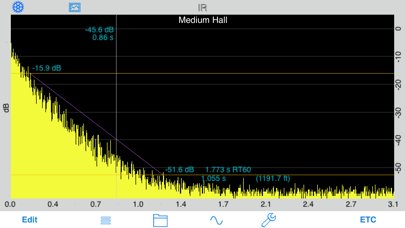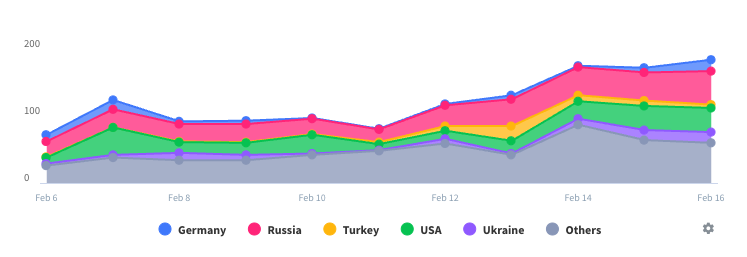
Description
Room Impulse Response measures audio characteristics of a room or loudspeaker.
Start by recording an impulse, such as a handclap or balloon pop, or record a swept sine and use the built-in deconvolution to create your Impulse Response (IR).
Now, view the ETC, with RT60 decay cursors, apply windowing if you wish, or trim the IR.
Next, see these other graphs:
** Impulse, where you can play back the actual IR
** ETC, which includes cursors to read out RT60 times directly, and allows pinch-zoom gesture for trimming the file. Apple a window, and see the effects of the window on the ETC plot.
** Schroeder curve, with EDT, T10, T20, and T30 markers
And then see these charts, all in either in Octave or 1/3 Octave bands:
** T20 or T30 (RT60) times
** Reverb Early Decay Times (EDT)
** Clarity C50
** Clarity C80
** CT times
** Definition
** Signal / Noise
And then you can also do spectral analysis, using our FFT, which can be windowed, for analyzing loudspeaker response without reflections, or see the 3D waterfall plot to view the decay of sound in the room by frequency, over time.
Works great with the internal iOS device microphone, or attach or iTestMic or iAudioInterface2 for fully professional results.
See the other great apps by Studio Six Digital, including AudioTools.
Hide
Show More...
Start by recording an impulse, such as a handclap or balloon pop, or record a swept sine and use the built-in deconvolution to create your Impulse Response (IR).
Now, view the ETC, with RT60 decay cursors, apply windowing if you wish, or trim the IR.
Next, see these other graphs:
** Impulse, where you can play back the actual IR
** ETC, which includes cursors to read out RT60 times directly, and allows pinch-zoom gesture for trimming the file. Apple a window, and see the effects of the window on the ETC plot.
** Schroeder curve, with EDT, T10, T20, and T30 markers
And then see these charts, all in either in Octave or 1/3 Octave bands:
** T20 or T30 (RT60) times
** Reverb Early Decay Times (EDT)
** Clarity C50
** Clarity C80
** CT times
** Definition
** Signal / Noise
And then you can also do spectral analysis, using our FFT, which can be windowed, for analyzing loudspeaker response without reflections, or see the 3D waterfall plot to view the decay of sound in the room by frequency, over time.
Works great with the internal iOS device microphone, or attach or iTestMic or iAudioInterface2 for fully professional results.
See the other great apps by Studio Six Digital, including AudioTools.
Screenshots
Room Impulse Response FAQ
-
Is Room Impulse Response free?
Room Impulse Response is not free (it costs 179.90), however it doesn't contain in-app purchases or subscriptions.
-
Is Room Impulse Response legit?
Not enough reviews to make a reliable assessment. The app needs more user feedback.
Thanks for the vote -
How much does Room Impulse Response cost?
The price of Room Impulse Response is 179.90.
-
What is Room Impulse Response revenue?
To get estimated revenue of Room Impulse Response app and other AppStore insights you can sign up to AppTail Mobile Analytics Platform.

User Rating
App is not rated in Israel yet.

Ratings History
Room Impulse Response Reviews
Store Rankings

Ranking History
App Ranking History not available yet

Category Rankings
App is not ranked yet
Room Impulse Response Installs
Last 30 daysRoom Impulse Response Revenue
Last 30 daysRoom Impulse Response Revenue and Downloads
Gain valuable insights into Room Impulse Response performance with our analytics.
Sign up now to access downloads, revenue, and more.
Sign up now to access downloads, revenue, and more.
App Info
- Category
- Music
- Publisher
-
Andrew Smith
- Languages
- English, French, German, Japanese, Polish, Chinese, Swedish
- Recent release
- 4.6 (3 months ago )
- Released on
- Feb 1, 2014 (10 years ago )
- Also available in
- China, France, Denmark, Kazakhstan, Japan, Lebanon, Mexico, Malaysia, Nigeria, Netherlands, Norway, New Zealand, Peru, Philippines, Pakistan, Poland, Portugal, Romania, Russia, Saudi Arabia, Sweden, Thailand, Türkiye, Taiwan, Ukraine, United States, South Africa, Algeria, Austria, Australia, Azerbaijan, Belgium, Brazil, Belarus, Canada, Switzerland, Chile, Czechia, Kuwait, Egypt, Finland, United Kingdom, Greece, Hong Kong SAR China, Hungary, Ireland, Israel, India, Argentina, Germany
- Last Updated
- 1 week ago





